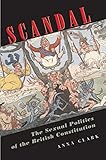Scandal : The Sexual Politics of the British Constitution / Anna Clark.
Material type: TextPublisher: Princeton, NJ : Princeton University Press, [2013]Copyright date: ©2003Edition: Course BookDescription: 1 online resource (328 p.) : 20 halftonesContent type:
TextPublisher: Princeton, NJ : Princeton University Press, [2013]Copyright date: ©2003Edition: Course BookDescription: 1 online resource (328 p.) : 20 halftonesContent type: - 9780691126012
- 9781400849543
- Constitutional history -- Great Britain
- Political corruption -- Great Britain -- History -- 18th century
- Political corruption -- Great Britain -- History -- 19th century
- Scandals -- Great Britain -- History -- 18th century
- Scandals -- Great Britain -- History -- 19th century
- Sex -- Political aspects -- Great Britain -- History -- 18th century
- Sex -- Political aspects -- Great Britain -- History -- 19th century
- HISTORY / Europe / Great Britain / General
- 328
- HQ18.G7 C53 2004
- online - DeGruyter
- Issued also in print.
| Item type | Current library | Call number | URL | Status | Notes | Barcode | |
|---|---|---|---|---|---|---|---|
 eBook
eBook
|
Biblioteca "Angelicum" Pont. Univ. S.Tommaso d'Aquino Nuvola online | online - DeGruyter (Browse shelf(Opens below)) | Online access | Not for loan (Accesso limitato) | Accesso per gli utenti autorizzati / Access for authorized users | (dgr)9781400849543 |
Frontmatter -- Contents -- Illustration -- Acknowledgments -- Abbreviations -- CHAPTER ONE. Introduction -- CHAPTER TWO. Wilkes, Sexuality, and Liberty: How Scandal Transforms Politics -- CHAPTER THREE. Influence or Independence:Women and Elections, 1777-1788 -- CHAPTER FOUR. Edmund Burke and the Begums of Oudh: Gender, Empire, and Public Opinion -- CHAPTER FIVE. Scandal in an Age of Revolution -- CHAPTER SIX. From Petticoat Influence to Women's Rights? -- CHAPTER SEVEN. The Mary Anne Clarke Affair and the System of Corruption -- CHAPTER EIGHT. Queen Caroline and the Sexual Politics of the British Constitution -- CHAPTER NINE. Sexual Scandals and Politics, Past and Present -- Notes -- Index
restricted access online access with authorization star
http://purl.org/coar/access_right/c_16ec
Are sex scandals simply trivial distractions from serious issues or can they help democratize politics? In 1820, George IV's "royal gambols" with his mistresses endangered the Old Oak of the constitution. When he tried to divorce Queen Caroline for adultery, the resulting scandal enabled activists to overcome state censorship and revitalize reform. Looking at six major British scandals between 1763 and 1820, this book demonstrates that scandals brought people into politics because they evoked familiar stories of sex and betrayal. In vibrant prose woven with vivid character sketches and illustrations, Anna Clark explains that activists used these stories to illustrate constitutional issues concerning the Crown, Parliament, and public opinion. Clark argues that sex scandals grew out of the tension between aristocratic patronage and efficiency in government. For instance, in 1809 Mary Ann Clarke testified that she took bribes to persuade her royal lover, the army's commander-in-chief, to promote officers, buy government offices, and sway votes. Could women overcome scandals to participate in politics? This book also explains the real reason why the glamorous Georgiana, Duchess of Devonshire, became so controversial for campaigning in a 1784 election. Sex scandal also discredited Mary Wollstonecraft, one of the first feminists, after her death. Why do some scandals change politics while others fizzle? Edmund Burke tried to stir up scandal about the British empire in India, but his lurid, sexual language led many to think he was insane. A unique blend of the history of sexuality and women's history with political and constitutional history, Scandal opens a revealing new window onto some of the greatest sex scandals of the past. In doing so, it allows us to more fully appreciate the sometimes shocking ways democracy has become what it is today.
Issued also in print.
Mode of access: Internet via World Wide Web.
In English.
Description based on online resource; title from PDF title page (publisher's Web site, viewed 29. Jul 2021)


